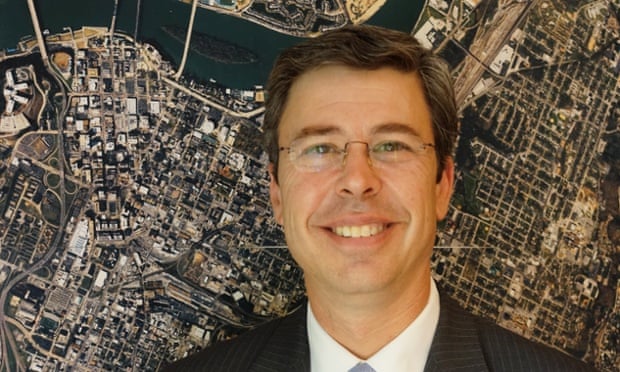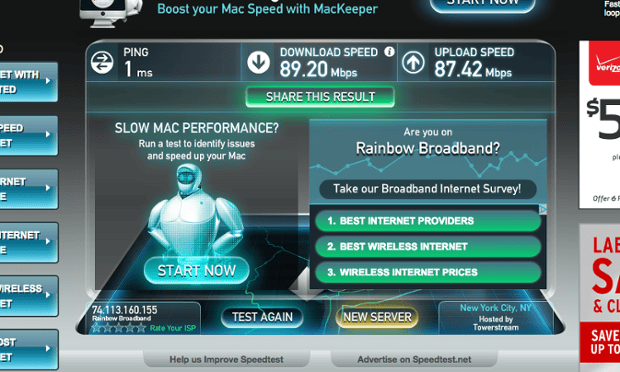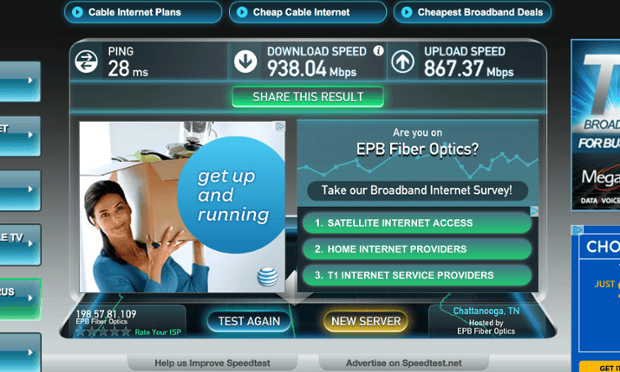Chattanooga's Gig: how one city's super-fast internet is driving a tech boom | US news | The Guardian
Fancy Rhino, a marketing and film production firm, has been working with The Howard School to include them in the city’s renaissance Photograph: Dominic Rushe/Guardian
Loveman’s department store on Market Street in Chattanooga closed its doors in 1993 after almost a century in business, another victim of a nationwide decline in downtowns that hollowed out so many US towns. Now the opulent building is buzzing again, this time with tech entrepreneurs taking advantage of the fastest internet in the western hemisphere.
Financed by the cash raised from the sale of logistics group Access America, a group of thirty-something local entrepreneurs have set up Lamp Post, an incubator for a new generation of tech companies, in the building. A dozen startups are currently working out of the glitzy downtown office.
“We’re not Silicon Valley. No one will ever replicate that,” says Allan Davis, one of Lamp Post’s partners. “But we don’t need to be and not everyone wants that. The expense, the hassle. You don’t need to be there to create great technology. You can do it here.”
He’s not alone in thinking so. Lamp Post is one of several tech incubators in this mid-sized Tennessee city. Money is flowing in. Chattanooga has gone from close to zero venture capital in 2009 to more than five organized funds with investable capital over $50m in 2014 – not bad for a city of 171,000 people.
The city’s go-getting mayor Andy Berke, a Democrat tipped for higher office, is currently reviewing plans for a city center tech zone specifically designed to meet the needs of its new workforce.
In large part the success is being driven by The Gig. Thanks to an ambitious roll-out by the city’s municipally owned electricity company, EPB, Chattanooga is one of the only places on Earth with internet at speeds as fast as 1 gigabit per second – about 50 times faster than the US average.
The tech buildup comes after more than a decade of reconstruction in Chattanooga that has regenerated the city with a world-class aquarium, 12 miles of river walks along the Tennessee River, an arts district built around the Hunter Museum of American Arts, high-end restaurants and outdoor activities.
But it’s the city’s tech boom has sparked interest from other municipalities across the world. It also comes as the Federal Communications Commission (FCC) prepares to address some of the biggest questions the internet has faced when it returns from the summer break. And while the FCC discusses whether Comcast, the world’s biggest cable company, should take over Time Warner, the US’s second largest cable operator, and whether to allow those companies to set up fast lanes (and therefore slow lanes) for internet traffic, Chattanooga is proof that another path is possible.
‘We now have people coming in looking to us as a leader’
It’s a story that is being watched very closely by Big Cable’s critics. “In DC there is often an attitude that the only way to solve our problems is to hand them over to big business. Chattanooga is a reminder that the best solutions are often local and work out better than handing over control to Comcast or AT&T to do whatever they want with us,” said Chris Mitchell, director of community broadband networks at advocacy group the Institute for Local Self-Reliance.
On Friday, the US telecoms industry called on the FCC to block Chattanooga’s plan to expand, as well as a similar plan for Wilson, North Carolina.
 ‘What the Gig did was change the idea of what our city could be,’ said Chattanooga mayor Andy Berke.Photograph: Dominic Rushe/Guardian
‘What the Gig did was change the idea of what our city could be,’ said Chattanooga mayor Andy Berke.Photograph: Dominic Rushe/Guardian“The success of public broadband is a mixed record, with numerous examples of failures,” USTelecom said in a blog post. “With state taxpayers on the financial hook when a municipal broadband network goes under, it is entirely reasonable for state legislatures to be cautious in limiting or even prohibiting that activity.”
Mayor Berke has dealt with requests for visits from everyone from tiny rural communities to “humungous international cities”. “You don’t see many mid-sized cities that have the kind of activity that we have right now in Chattanooga,” he said. “What the Gig did was change the idea of what our city could be. Mid-sized southern cities are not generally seen as being ahead of the technological curve, the Gig changed that. We now have people coming in looking to us as a leader.”
It’s still early days but there have already been notable successes. In addition to Access America’s sale for an undisclosed sum, last year restaurant booking site OpenTable bought a local company, QuickCue, for $11.5m. “That’s a great example of a story that just doesn’t happen in other mid-sized southern cities,” said Berke.
But it’s what Chattanooga can do next that has the local tech community buzzed.
EPB’s high-speed network came about after it decided to set up a smart electric grid in order to cut power outages. EPB estimated it would take 10 years to build the system and raised a $170m through a municipal bond to pay for it. In 2009 president Barack Obama launched the American Recovery and Reinvestment Act, a stimulus programme aimed at getting the US economy back on track amid the devastation of the recession. EPB was awarded $111m to get its smart grid up and running. Less than three years later the whole service territory was built.
The fibre-optic network uses IntelliRupter PulseClosers, made by S&C Electric, that can reroute power during outages. The University of California at Berkeley estimates that power outages cost the US economy $80bn a year through business disruption with manufacturers stopping their lines and restaurants closing. Chattanooga’s share of that loss was about $100m, EPB estimates. The smart grid can detect a fault in milliseconds and route power around problems. Since the system was installed the duration of power outages has been cut in half.
But it was the other uses of that fiber that fired up enthusiasm in Chattanooga. “When we first started talking about this and the uses of the smart grid we would say to customers and community groups ‘Oh and it can also offer very high-speed internet, TV and phone.’ The electric power stuff was no longer of interest. This is what what people got excited about and it’s the same today,” said EPB vice president Danna Bailey.
For consumers the change is noticeable but incremental. “You don’t need a Gig to load Google.com faster,” says Berke. If you are downloading a lot of movies, though, there’s a huge time savings: it takes just 33 seconds to download a two-hour, high-definition movie in Chattanooga, compared with 25 minutes for the average high-speed broadband household. And it does mean that a family streaming video from their various devices is unlikely to ever see those spinning wheels of delay that bug the rest of the US on a daily basis. Nor are they likely to suffer outages like the one Time Warner Cable experienced this week, which is now under investigation by the New York attorney general. For Chattanoogans the internet is always on and always blazing fast.
For business, the Gig offers a new set of challenges and opportunities. If we are moving towards an “internet of things” with smart, driverless cars, home automation, delivery drones, robot construction, we will need more bandwidth and more reliability. “You can’t do that with cell towers,” says Sheldon Grizzle, co-founder of Spartan Ventures and another of the city’s tech entrepreneurs. Nor can you do that with an internet system like the one in the US, the 31st fastest in the world according to a recent report by Ookla Speedtest, behind countries including Estonia, Hungary, Slovakia, and Uruguay.
‘It’s like the early days of the internet’
Grizzle and others have the opposite problem, they are now working out what they can do with the Gig. “It’s like the early days of the internet, it takes time to figure out what you can do with this,” he said.
 Internet speeds at the Guardian US officePhotograph: screengrab
Internet speeds at the Guardian US officePhotograph: screengrab The same test run in Chattanoga, TennesseePhotograph: screengrab
The same test run in Chattanoga, TennesseePhotograph: screengrabAnd therein lies Chattanooga’s dilemma. At present the city is like a deep sea port capable of handling enormous ships that none of its neighbours can receive. There are other Gig cities, including Lafayette, Louisiana and Bristol, Virginia. Google has plans to roll out its own fibre systems in cities including Kansas City, Kansas, and Austin, Texas. But none yet are as large or as advanced as Chattanooga.
Some companies are already coming up against the limits. Medical researchers are using Chattanooga’s high-speed network to build 3D models of aneurysms to allow surgeons to pre-plan operations but transmitting that information outside the city for a real-time diagnosis would mean relying on the antiquated cable networks of the incumbents who have, so far, been reluctant to upgrade their systems.
“It’s better for us if it gets more places in our community and in the country,” says Berke. Chattanooga is too small to support all the business it is creating, he warned: “If there’s no market for what happens on the Gig here, we are doing a lot of work for nothing.” But Berke is hopeful. “The history of the internet and technology has been that you always need more speed and capacity. We have the fastest, cheapest most pervasive internet in the western hemisphere. We believe that gives us an advantage but soon it’s going to be much more the norm and we want to be able to participate in that kind of economy.”
Digital inclusion: ‘You can’t ignore your neighbors’
Chattanooga’s success is all the more remarkable because it almost didn’t happen. The cable companies sued twice to stop it getting off the ground. It’s a story that has been repeated across the US where the cable companies have successfully lobbied for legislation in 19 states that ensures that municipal utilities cannot offer broadband internet.
The competitive disadvantage they face is clear. EPB now has about 60,000 residential and 4,500 business customers out of a potential 160,000 homes and businesses. Comcast hasn’t upgraded its network but it has gone on the offensive, offering cutthroat introductory offers and gift cards for people who switch back. “They have been worthy competitors,” said Bailey. “They’ve been very aggressive.”
EPB is lobbying the FCC to expand its footprint beyond its electric power territory to nearby communities. Many of those communities are still relying on dial-up to get online. For Beyer, who appoints EPB’s board, the expansion is part of what he sees as his mandate to make sure everyone has access to high speed internet.
“Today I talk to people who may never have been on the internet and don’t want to be. But they also understand that their kids and grandkids have to be,” he said. Chattanooga’s population is a third African American and that population is disproportionately affected by poverty and urban blight.
To address that, in part, the city’s library is taking full advantage of the Gig, its has 3D printers, laser cutters and offers coding classes. Ken Hays, a local developer and the chief of staff under former mayor Jon Kinsey, now runs the city-backed Enterprise Center which is assessing the impact of the Gig.
In his recent report “Chattanooga Forward” he wrote the city “will only be successful in this new economy if we focus effective efforts on increasing digital inclusion among all citizens”. The city is making sure schools have access to devices for its children to get online. Fancy Rhino, a marketing and film production firm backed by Lamp Post, has been working with The Howard School, an inner-city school, to include them in the city’s renaissance.
Build me a worldThe company put out a documentary about the school in 2012, Build me A World, and continues to run The Studio, a project to teach children at the school digital skills and make music and videos. “You can’t ignore your neighbours here. We have big issues with education, we need to put something back into the community,” said Drew Belz, who founded the company with cousin Isaiah Smallman.
Bailey said EPB could afford to be more community minded because of its structure. “We don’t have to worry about stockholders, our customers are our stockholders. We don’t have to worry about big salaries, about dividends. We get to wake up everyday and think about what, within business reason, is good for this community,” she said.
“The private sector doesn’t have that same motivation. It’s perfectly fair, they are motivated by profits and stockholders. they have a lot of capital already invested in existing infrastructure. It would be costly to overbuild themselves.”
There are hundreds of other municipally owned electric companies across the US, some even in states where Big Cable has yet to force a ban on them building broadband. But Mitchell said few had the skills, or the political backing, to pull off what EPB had done on this scale.
Berke said they had no choice. “The Gig wasn’t coming here anytime soon without us doing it,” he said. “It was going to go a lot of places before it came to Chattanooga. For us, like a lot of cities, you either decide to do it yourself or you wait in line. We chose to do it ourselves.”